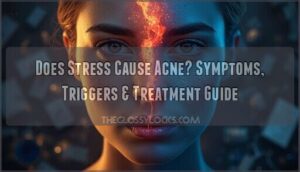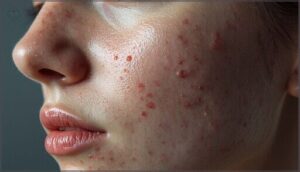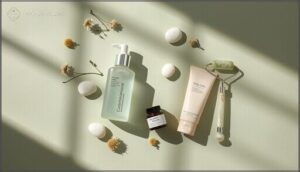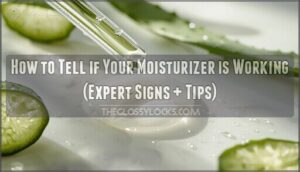This site is supported by our readers. We may earn a commission, at no cost to you, if you purchase through links.
Your breakout appeared exactly three days before that major presentation, didn’t it? That timing isn’t coincidence—it’s cortisol. When your body perceives threat, whether it’s a looming deadline or a difficult conversation, your adrenal glands flood your system with stress hormones that trigger a cascade of skin changes.
These hormones don’t just make you feel anxious; they instruct your sebaceous glands to produce excess oil, weaken your skin’s protective barrier, and create the perfect environment for acne bacteria to thrive. The connection between your mental state and your complexion runs deeper than most people realize, involving specific hormonal pathways, inflammatory responses, and measurable changes in skin chemistry.
Understanding these mechanisms gives you real leverage—because once you know how stress triggers breakouts, you can interrupt the cycle with targeted treatments and lifestyle adjustments that address both the symptoms on your face and the underlying stress response in your body.
Table Of Contents
- Key Takeaways
- What is Stress Acne
- Does Stress Really Cause Acne
- What Does Stress Acne Look Like
- How Stress Affects Your Skin
- How to Treat Stress Acne
- How to Prevent Stress Acne
- When to See a Dermatologist
- Frequently Asked Questions (FAQs)
- What does stress acne look like?
- Why do I break out when I’m stressed?
- Can stress cause a rash?
- What is stress acne?
- How does stress affect your skin?
- Does stress affect acne severity?
- Can stress cause acne breakouts?
- Can stress cause Acne blemish?
- How to prevent stress acne?
- What does acne from stress look like?
- Conclusion
Key Takeaways
- Stress triggers a measurable hormonal cascade involving cortisol and androgens that directly instructs your sebaceous glands to overproduce oil, weaken your skin barrier, and create the inflammatory environment where acne bacteria thrive—making the mind-skin connection a physiological reality, not just correlation.
- Stress acne typically clusters in oil-rich zones like your forehead and jawline, appearing 1-3 weeks after major stressors as small red papules mixed with whiteheads, and it persists longer than other breakout types because elevated cortisol actively slows your skin’s natural healing process.
- Effective treatment requires addressing both the visible breakouts through targeted ingredients like benzoyl peroxide, salicylic acid, and retinoids, and the underlying stress response through evidence-based techniques like mindfulness, consistent sleep, and dietary adjustments that lower baseline cortisol levels.
- You should consult a dermatologist when breakouts persist beyond 6-8 weeks despite consistent home treatment, develop into deep painful nodules, show signs of scarring or infection, or create significant emotional distress that affects your daily life and social interactions.
What is Stress Acne
Stress acne is a type of acne that flares up when your body is under psychological or emotional strain, though it doesn’t always look different from breakouts caused by other triggers.
When stress hormones spike, your skin often produces excess oil and inflammation, making it harder to get rid of blackheads and other stubborn blemishes.
The connection between your mind and your skin runs deeper than you might think, affecting everything from oil production to how quickly blemishes heal. Understanding what makes stress acne unique can help you recognize it when it happens and take the right steps to get your skin back on track.
Definition and Characteristics
Stress acne refers to breakouts that flare or worsen during periods of emotional or physical strain rather than appearing randomly. You’ll notice common acne lesions—whiteheads, blackheads, red bumps, and pus-filled pimples—developing in direct response to stressful events, driven by stress-related hormonal changes and behavioral shifts like face-touching or skipped skincare routines that exacerbate acne triggers and alter breakout patterns.
Stress can substantially increase acne severity by affecting oil and dead skin buildup in the pores.
How Stress Acne Differs From Other Types
While all acne breakouts share clogged pores, stress acne reveals distinct patterns that set it apart. Unlike hormonal acne that follows monthly cycles or cystic acne that runs deeper, stress-related acne flares during high-pressure periods and settles when life calms down.
Key differences include:
- Timing: Stress acne appears 1-3 weeks after major stressors like exams or deadlines, whereas typical acne builds gradually
- Location: Breakouts cluster on your forehead and jawline—oil-rich zones that react quickly to stress hormones
- Texture: You’ll notice clusters of small red papules mixed with whiteheads, creating patchy, rough skin texture during anxious periods
Breakout triggers tied to cortisol surges create inflammatory responses different from purely genetic or bacterial causes. The impact of cortisol on skin health can be a key reason stress acne stands apart from other types.
Physical and Emotional Impact
Beyond red bumps lies a deeper toll—your skin sensitivity climbs under emotional strain, making every touch sting while stress acne keeps healing at bay.
About 70 percent of people with breakouts report self esteem struggles, avoiding social events and feeling self-conscious at work. This mental health burden feeds a vicious cycle: stress related acne worsens mood, which spikes cortisol and triggers more breakouts, demanding thoughtful stress management.
About 70 percent of people with breakouts struggle with self-esteem, creating a vicious cycle where stress-related acne worsens mood, spikes cortisol, and triggers more breakouts
Does Stress Really Cause Acne
Yes, stress really can cause acne, though the connection isn’t always straightforward. Your body’s stress response triggers a cascade of hormonal changes that directly affect your skin’s oil production, inflammation levels, and healing ability.
Here’s what happens inside your body when stress and acne collide.
How Stress Affects Hormones and Oil Production
Your body doesn’t just react to stress in your mind—it rewrites your skin’s playbook, too. When life feels overwhelming, the stress response kicks off a hormonal chain reaction that turns sebaceous glands into oil factories, fueling the cycle of stress-related acne and hormonal acne.
- Hormone imbalance: Stress floods your system with androgens, triggering your sebaceous glands to pump out extra oil that clogs pores and sets the stage for breakouts.
- Inflammation causes: Stress signals don’t travel alone—they bring inflammatory molecules along, making every pimple redder, angrier, and slower to heal.
- Oil production shifts: Beyond quantity, stress reshapes your skin’s sebum into a stickier, more irritating blend that feeds acne bacteria and weakens your natural barrier.
Role of Cortisol and Androgens
Understanding the core culprits behind stress-related acne means zeroing in on two hormone heavyweights: cortisol and androgens. When your stress response ignites, it doesn’t politely ask permission—it floods your bloodstream with these compounds, reshaping your skin from the inside out.
Dialing down that cortisol spike through proven strategies to clear breakouts quickly can help interrupt the cycle before it wreaks havoc on your complexion.
| Hormone | Source & Trigger | Effect on Skin |
|---|---|---|
| Cortisol | Released from adrenal glands during stress; activates entire body stress response | Stimulates oil glands directly, boosts sebum output, keeps inflammation simmering |
| Androgens (Testosterone, DHEA) | Stress signals trigger adrenal production; glands may intensify these locally | Bind to receptors in follicles, drive oil synthesis, thicken pore linings |
| Combined surge | Stress hormones rise together during exams, deadlines, emotional strain | Overlapping signals turn sebaceous glands into overdrive, clogging pores faster |
| Local conversion | Sebaceous glands convert weaker androgens into potent forms right in the follicle | High androgen activity at pore level even when blood tests look normal |
Cortisol effects begin when your hypothalamic-pituitary-adrenal axis fires up, ramping up both your mental tension and your skin’s oil production in one sweep. Higher cortisol levels don’t just float through your system—they dock onto sebaceous glands, instructing them to churn out more sebum and making every pore a potential trap for debris and bacteria. At the same time, cortisol keeps your body in a low-grade inflammatory state, so existing breakouts look angrier, feel more tender, and take longer to fade.
Androgen levels climb alongside cortisol because the same stress signals that release cortisol also push your adrenal glands to produce testosterone, androstenedione, and DHEA. These androgens bind to receptors on sebocytes—the cells that make oil—prompting them to enlarge, multiply, and pump out thicker sebum that clogs follicles faster. Women with hormonal acne often show higher serum testosterone and androstenedione even within normal lab ranges, making their skin especially reactive during stressful stretches.
What makes this hormone imbalance particularly sneaky is how cortisol and androgen work as a tag team. Stress triggers both at once, so your sebaceous glands receive overlapping marching orders: grow bigger, produce more oil, and stay inflamed. That’s why exam weeks, work crises, or emotional upheaval can suddenly pepper your forehead, jawline, or chest with clusters of new pimples—your skin is responding to a double dose of hormonal pressure.
Even more fascinating, your sebaceous glands don’t wait passively for hormones to arrive from your bloodstream. Enzymes like 5-alpha-reductase inside the follicle convert weaker androgens into dihydrotestosterone, the most potent form, right where breakouts begin. This local conversion means androgen activity at the pore can spike even if your overall androgen levels look fine, turning certain areas—face, chest, back—into hot zones for stress-induced flares.
Hormonal imbalance during stress also nudges other players into the game. Cortisol can indirectly boost insulin and prolactin, which then intensify androgen influence and push oil production higher still. Inflammatory molecules released by stressed skin cells add fuel to the fire, making each pimple redder, more swollen, and slower to settle. Oxidative stress around the follicle modifies sebum lipids like squalene, transforming them into even more pore-clogging compounds that lock you into a cycle of recurring bumps.
For different groups, the cortisol-androgen connection plays out in distinct ways. Adult women often see a stronger link between adrenal androgens, cortisol surges, and persistent breakouts, especially around their menstrual cycle. Teenagers face a double whammy: natural puberty-driven androgen spikes plus high-school stress, making their skin inflammation more intense. People with conditions like polycystic ovary syndrome may find that stress-related cortisol spikes aggravate already elevated androgens, leading to stubborn jawline or lower-face lesions that resist standard treatment.
Recognizing how cortisol and androgen fuel your skin inflammation gives you real leverage. When you understand that stress isn’t just “in your head” but actively reprogramming your oil glands and pore behavior, you can take targeted steps—both to calm your stress response and to manage the hormonal fallout on your skin.
Scientific Evidence and Studies
Research linking stress and acne keeps piling up, giving you hard data to back what your mirror already shows. University students with high perceived stress show markedly higher acne severity scores than low-stress peers, and exam periods trigger measurable jumps in breakout grade among female undergraduates.
Here’s what the science confirms about stress-induced acne:
- Hormone impact: Elevated stress correlates with higher sebum output on your forehead and nose, even when diet stays constant.
- Inflammation causes: Psychological pressure releases pro-inflammatory cytokines that intensify redness, swelling, and tenderness in existing spots.
- Sleep and mood: Adults with worse sleep quality score higher on acne severity scales, independent of depression symptoms.
Cross-sectional data across adolescent and young adult populations consistently place stress among the most common self-identified acne triggers, with those in the highest stress categories reporting recent flare-ups far more often than relaxed peers.
What Does Stress Acne Look Like
Stress acne doesn’t have a single signature look, which can make it tricky to distinguish from breakouts triggered by other factors like hormones or bacteria. That said, certain patterns in how your skin reacts during high-stress periods can offer clues that stress is playing a role.
Understanding the common types of blemishes and where they tend to show up can help you connect the dots between your mental state and what’s happening on your skin.
Common Types and Symptoms
Stress acne often presents as a mix of acne lesions, including whiteheads (closed comedones beneath the skin’s surface), blackheads (open comedones at pore openings), and inflamed papules or pustules that appear redder and more swollen than typical acne breakouts.
You’ll notice these pimple formations feel tender to touch, with noticeable facial redness and skin inflammation that persists longer because stress slows your skin’s natural healing process.
Where Stress Acne Typically Appears
Your stress-induced acne often clusters where oil glands work hardest—primarily across the forehead, nose, and chin (the T-zone), though stress-related acne and stress triggers can also push facial acne toward your cheeks and jawline.
Body breakouts from acne and stress commonly appear on your chest, upper back, and shoulders, where sweat and friction combine with elevated oil production to create inflamed acne locations.
How Stress Affects Your Skin
When stress response takes hold, your skin doesn’t just break out—it struggles to protect and repair itself.
The body’s stress response disrupts multiple skin functions at once, from the protective outer layer to the healing processes happening beneath the surface. Understanding these effects can help you see why stress acne often feels more stubborn and inflamed than typical breakouts.
Impact on Skin’s Natural Barrier Function
Your skin’s natural defense system takes a real hit when you’re under pressure. Psychological strain disrupts barrier disruption by reducing ceramides and cholesterol, which weakens the shield that keeps irritants out and moisture in.
This lipid imbalance increases skin permeability, allowing comedogenic substances to penetrate more easily. The microbiome shift adds another layer of vulnerability, leaving your skin barrier fragile and prone to stress acne flare-ups.
Effect on Inflammation and Healing
When you’re under pressure, your body shifts into defense mode, and your skin pays the price. Stress hormones flood your system, triggering a cascade of inflammatory skin conditions that make breakouts angrier and slower to fade.
- Inflammation response intensifies: Ongoing stress releases inflammatory chemicals that make pimples redder, more swollen, and painful, with immune cells becoming less effective at calming the reaction.
- Healing delays extend recovery: Stress-related acne spots can take up to 40 percent longer to heal because stress chemicals slow down cell movement and reduce oxygen delivery to damaged areas.
- Neurogenic inflammation amplifies damage: Stress signals cause nerve cells to release substances that worsen swelling around breakouts, creating a feedback loop that prolongs inflammation and weakens your skin barrier.
This triple threat means stress and skin health are deeply connected—each flare-up lingers longer, and new blemishes often appear before old ones resolve, creating that frustrating cycle of constant breakouts.
How to Treat Stress Acne
Treating stress acne effectively requires a multi-layered approach that targets both the immediate breakouts and the underlying hormonal triggers that fuel them.
Your treatment strategy might include over-the-counter solutions for mild cases, prescription options when inflammation runs deeper, or a combination of both depending on severity.
Building the right routine means knowing which ingredients actually work, when to seek professional help, and how to create a consistent plan that won’t overwhelm already-stressed skin.
Over-the-Counter Treatments and Ingredients
You’ll find several proven ingredients in over-the-counter acne treatment products that target stress acne at different stages.
Benzoyl peroxide (in 2.5 to 10 percent concentrations) kills acne-causing bacteria while clearing excess oil, though lower strengths often work as effectively with less irritation. Salicylic acid penetrates pores to dissolve buildup, making it particularly useful for blackheads and whiteheads.
Prescription Medications and Professional Treatments
When over-the-counter options don’t clear your breakouts, dermatologists can prescribe stronger interventions suited to your skin’s needs.
Topical retinoids like tretinoin speed up cell turnover to prevent clogged pores, while oral antibiotics reduce inflammation and bacteria in moderate to severe cases.
Hormonal therapies help women by lowering androgen-driven oil production, and professional procedures—chemical peels, laser treatments, and targeted acne treatment options—address stubborn lesions that resist at-home care.
Building an Effective Skincare Routine
Whether you’re starting with prescriptions or working solo, a simplified skincare routine for acne keeps your skin barrier intact while targeting breakouts.
Your morning routine should include gentle cleansing with a mild product, a niacinamide serum to calm stress-related inflammation, oil-free moisturizer, and broad-spectrum SPF—simple daily routines that support acne treatment without overwhelming already-stressed skin.
How to Prevent Stress Acne
You can’t eliminate stress entirely, but you can shift how your body reacts to it—and that makes all the difference for your skin.
Prevention centers on building habits that reduce cortisol spikes, support your skin’s barrier function, and minimize inflammation before breakouts start. The following strategies address stress management, lifestyle adjustments, and nutritional factors that work together to keep your complexion clear.
Stress Management Techniques for Clearer Skin
Managing stress effectively can break the cycle of stress-induced acne by lowering cortisol and supporting your skin’s natural healing.
Mindful meditation for 10 to 15 minutes daily stabilizes mood and reduces flare-ups, while breathing exercises like the 4-7-8 pattern calm your nervous system within minutes.
Building daily routines with consistent sleep, short outdoor breaks, and gentle movement creates predictable anchors that keep baseline stress lower and give acne-prone skin a steadier environment to stay clear.
Lifestyle Changes That Support Skin Health
Daily habits outside your skincare routine shape how stress-related acne behaves and how quickly your skin heals. Sleep patterns that deliver seven to nine hours nightly give your barrier time to repair, which lowers inflammation and helps skin stay clear.
Additional wellness pillars include:
- Quitting smoking to restore oxygen flow and collagen production
- Limiting alcohol to reduce oil surges and facial redness
- Moving daily to boost circulation and deliver repair factors to skin
- Keeping a gentle skin care routine that won’t strip natural oils
- Practicing relaxation techniques to support overall stress management and skin health
Dietary and Hydration Considerations
What you eat directly affects how your skin reacts to stress. High‑glycemic foods like white bread and sugary sodas spike insulin, triggering more oil and worsening hormonal acne.
While dairy—especially skim milk—can aggravate inflammatory foods pathways, focus on nutrient balance with whole grains, omega‑3s, and zinc‑rich options, and aim for six to eight cups of water daily to support skin pH levels and barrier repair.
When to See a Dermatologist
While many cases of stress acne improve with over-the-counter treatments and lifestyle adjustments, there are times when professional intervention becomes necessary.
A dermatologist can assess your skin’s condition, distinguish stress-related breakouts from other underlying issues, and develop a treatment strategy suited to your specific needs. Recognizing when to seek expert guidance can prevent scarring, address persistent inflammation, and help you regain control over both your skin and your stress response.
Signs Your Stress Acne Needs Professional Help
Most stress-related acne reacts to consistent home care, but certain red flags mean it’s time to call in reinforcements. You don’t need to tough it out when your skin is sending clear signals that it needs more than over-the-counter solutions—recognizing these warning signs protects both your skin health and emotional wellbeing.
- Persistent breakouts lasting beyond 6 to 8 weeks despite daily treatment show treatment resistance
- Deep, painful nodules or cysts that throb or hurt when you move your face indicate acne severity requiring dermatology intervention
- Scarring risks like pitted marks, texture changes, or dark spots that linger for months after healing
- Skin infection signs including spreading redness, fever, hot tender areas, or thick pus
- Emotional toll that makes you avoid social situations, mirrors, or video calls because of stress acne
Creating a Customized Treatment Plan
Your dermatologist doesn’t hand everyone the same photocopied handout—you deserve a plan built around your skin, your schedule, and your triggers. During your skin assessment, they’ll classify lesion types, review failed products, and document stress patterns that fuel breakouts. Together, you’ll design customized care that pairs medication plans with a realistic skin care routine, then schedule routine maintenance check-ins to adjust treatment options as your life and skin evolve.
| Treatment Phase | What Happens |
|---|---|
| Initial Assessment | Full exam noting acne type, severity, triggers, and current products to avoid repeating failures |
| Medication Selection | Combine topicals like retinoids with oral options if needed, matched to your skin type and tolerance |
| Routine Design | Clear instructions on when to apply each product, how to layer without irritation, and which noncomedogenic products support acne treatment |
| Follow-Up Visits | Check-ins every 6 to 12 weeks to measure response, adjust doses, and catch dryness or new breakouts early |
| Long-Term Strategy | Shift focus to maintenance and fading dark marks once active stress acne is controlled, tweaking the plan as stress levels change |
Addressing Underlying Stress and Mental Health
Acne doesn’t live in isolation—your skin mirrors what’s happening inside. If emotional stress, anxiety, or chronic worry keep driving stress related acne, you need a plan that addresses both skin and mind.
Ask your dermatologist about mental health awareness resources, mindful relaxation practices, and stress management techniques that build stress resilience. True emotional wellness and self care create the mental balance that fosters lasting clear skin.
Frequently Asked Questions (FAQs)
What does stress acne look like?
Like a rash, that mirrors your inner chaos, stress-related acne usually appears as clusters of small red or pink papules and pustules, scattered across your forehead, cheeks, and jawline in distinct breakout patterns.
Why do I break out when I’m stressed?
When you’re under pressure, your body releases cortisol and androgens that tell oil glands to work harder, clog pores faster, and boost inflammation—turning minor bumps into red, swollen breakouts.
Can stress cause a rash?
Yes, stress can trigger rashes like hives and eczema flares by prompting your immune system to release histamine and inflammatory chemicals, creating raised, itchy welts or rough, irritated patches across your skin.
What is stress acne?
When emotional strain or physical pressure triggers breakouts, you’re experiencing stress-induced acne—a flare caused by stress hormones that boost oil production, worsen skin inflammation, and create predictable breakout patterns during high-stress periods.
How does stress affect your skin?
Stress hormones like cortisol weaken your skin barrier, ramp up oil production, and fuel inflammation response that makes breakouts redder and more swollen—leaving you with stress-induced acne and heightened skin sensitivity.
Does stress affect acne severity?
Higher cortisol levels and androgens during stressful periods boost oil production and skin inflammation, making breakouts redder, more swollen, and longer-lasting.
Research shows stress scores directly correlate with worsening acne severity grades.
Can stress cause acne breakouts?
When tension builds, your body releases stress hormones that ramp up oil production, clog pores, and fuel skin inflammation—turning emotional wellness struggles into visible breakout patterns that demand both skincare for stress and managing stress acne strategies.
Can stress cause Acne blemish?
Yes, emotional strain triggers acne blemishes by raising stress hormones like cortisol and androgens, which increase oil production, worsen skin inflammation, and weaken your skin’s protective barrier, creating ideal conditions for breakout patterns.
How to prevent stress acne?
Preventing stress-related acne requires a multi-pronged approach: maintain a consistent skin care routine with noncomedogenic products, practice stress reduction techniques like mindfulness or yoga.
Prioritize sleep, and support your skin through healthy diet and hydration choices.
What does acne from stress look like?
Stress acne symptoms usually show up as clusters of small red papules and pustules, often concentrated across your forehead, cheeks, and jawline, with inflamed bumps that feel tender and may linger longer than typical breakouts.
Conclusion
Your skin functions as a mirror, reflecting internal turbulence through visible breakouts—and understanding that stress cause acne reveals the bidirectional pathway between your nervous system and your complexion.
Armed with evidence-based treatments, barrier-supporting skincare, and stress-reduction protocols that lower cortisol levels, you’re not managing symptoms blindly anymore. You’re interrupting the hormonal cascade at its source, reclaiming both your skin’s clarity and your body’s equilibrium through targeted, scientifically validated intervention.











